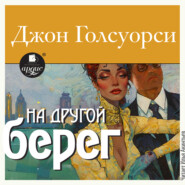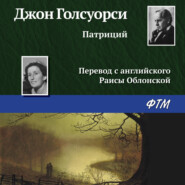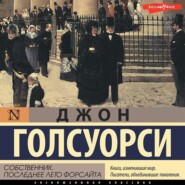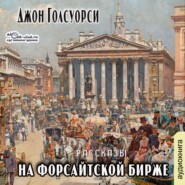По всем вопросам обращайтесь на: info@litportal.ru
(©) 2003-2024.
✖
The Forsyte Saga - Complete
Настройки чтения
Размер шрифта
Высота строк
Поля
But as young Jolyon had in his constitution the elements of impartiality, he reflected that to stigmatize as barbarity that which was merely lack of imagination must be wrong; for none who held these views had been placed in a similar position to the animals they caged, and could not, therefore, be expected to enter into their sensations. It was not until they were leaving the gardens — Jolly and Holly in a state of blissful delirium — that old Jolyon found an opportunity of speaking to his son on the matter next his heart. “I don’t know what to make of it,” he said; “if she’s to go on as she’s going on now, I can’t tell what’s to come. I wanted her to see the doctor, but she won’t. She’s not a bit like me. She’s your mother all over. Obstinate as a mule! If she doesn’t want to do a thing, she won’t, and there’s an end of it!”
Young Jolyon smiled; his eyes had wandered to his father’s chin. ‘A pair of you,’ he thought, but he said nothing.
“And then,” went on old Jolyon, “there’s this Bosinney. I should like to punch the fellow’s head, but I can’t, I suppose, though — I don’t see why you shouldn’t,” he added doubtfully.
“What has he done? Far better that it should come to an end, if they don’t hit it off!”
Old Jolyon looked at his son. Now they had actually come to discuss a subject connected with the relations between the sexes he felt distrustful. Jo would be sure to hold some loose view or other.
“Well, I don’t know what you think,” he said; “I dare say your sympathy’s with him — shouldn’t be surprised; but I think he’s behaving precious badly, and if he comes my way I shall tell him so.” He dropped the subject.
It was impossible to discuss with his son the true nature and meaning of Bosinney’s defection. Had not his son done the very same thing (worse, if possible) fifteen years ago? There seemed no end to the consequences of that piece of folly.
Young Jolyon also was silent; he had quickly penetrated his father’s thought, for, dethroned from the high seat of an obvious and uncomplicated view of things, he had become both perceptive and subtle.
The attitude he had adopted towards sexual matters fifteen years before, however, was too different from his father’s. There was no bridging the gulf.
He said coolly: “I suppose he’s fallen in love with some other woman?”
Old Jolyon gave him a dubious look: “I can’t tell,” he said; “they say so!”
“Then, it’s probably true,” remarked young Jolyon unexpectedly; “and I suppose they’ve told you who she is?”
“Yes,” said old Jolyon, “Soames’s wife!”
Young Jolyon did not whistle: The circumstances of his own life had rendered him incapable of whistling on such a subject, but he looked at his father, while the ghost of a smile hovered over his face.
If old Jolyon saw, he took no notice.
“She and June were bosom friends!” he muttered.
“Poor little June!” said young Jolyon softly. He thought of his daughter still as a babe of three.
Old Jolyon came to a sudden halt.
“I don’t believe a word of it,” he said, “it’s some old woman’s tale. Get me a cab, Jo, I’m tired to death!”
They stood at a corner to see if an empty cab would come along, while carriage after carriage drove past, bearing Forsytes of all descriptions from the Zoo. The harness, the liveries, the gloss on the horses’ coats, shone and glittered in the May sunlight, and each equipage, landau, sociable, barouche, Victoria, or brougham, seemed to roll out proudly from its wheels:
‘I and my horses and my men you know,’ Indeed the whole turn-out have cost a pot. But we were worth it every penny. Look At Master and at Missis now, the dawgs! Ease with security — ah! that’s the ticket!
And such, as everyone knows, is fit accompaniment for a perambulating Forsyte.
Amongst these carriages was a barouche coming at a greater pace than the others, drawn by a pair of bright bay horses. It swung on its high springs, and the four people who filled it seemed rocked as in a cradle.
This chariot attracted young Jolyon’s attention; and suddenly, on the back seat, he recognised his Uncle James, unmistakable in spite of the increased whiteness of his whiskers; opposite, their backs defended by sunshades, Rachel Forsyte and her elder but married sister, Winifred Dartie, in irreproachable toilettes, had posed their heads haughtily, like two of the birds they had been seeing at the Zoo; while by James’ side reclined Dartie, in a brand-new frock-coat buttoned tight and square, with a large expanse of carefully shot linen protruding below each wristband.
An extra, if subdued, sparkle, an added touch of the best gloss or varnish characterized this vehicle, and seemed to distinguish it from all the others, as though by some happy extravagance — like that which marks out the real ‘work of art’ from the ordinary ‘picture’ — it were designated as the typical car, the very throne of Forsytedom.
Old Jolyon did not see them pass; he was petting poor Holly who was tired, but those in the carriage had taken in the little group; the ladies’ heads tilted suddenly, there was a spasmodic screening movement of parasols; James’ face protruded naively, like the head of a long bird, his mouth slowly opening. The shield-like rounds of the parasols grew smaller and smaller, and vanished.
Young Jolyon saw that he had been recognised, even by Winifred, who could not have been more than fifteen when he had forfeited the right to be considered a Forsyte.
There was not much change in them! He remembered the exact look of their turn-out all that time ago: Horses, men, carriage — all different now, no doubt — but of the precise stamp of fifteen years before; the same neat display, the same nicely calculated arrogance ease with security! The swing exact, the pose of the sunshades exact, exact the spirit of the whole thing.
And in the sunlight, defended by the haughty shields of parasols, carriage after carriage went by.
“Uncle James has just passed, with his female folk,” said young Jolyon.
His father looked black. “Did your uncle see us? Yes? Hmph! What’s he want, coming down into these parts?”
An empty cab drove up at this moment, and old Jolyon stopped it.
“I shall see you again before long, my boy!” he said. “Don’t you go paying any attention to what I’ve been saying about young Bosinney — I don’t believe a word of it!”
Kissing the children, who tried to detain him, he stepped in and was borne away.
Young Jolyon, who had taken Holly up in his arms, stood motionless at the corner, looking after the cab.
CHAPTER VII — AFTERNOON AT TIMOTHY’S
If old Jolyon, as he got into his cab, had said: ‘I won’t believe a word of it!’ he would more truthfully have expressed his sentiments.
The notion that James and his womankind had seen him in the company of his son had awakened in him not only the impatience he always felt when crossed, but that secret hostility natural between brothers, the roots of which — little nursery rivalries — sometimes toughen and deepen as life goes on, and, all hidden, support a plant capable of producing in season the bitterest fruits.
Hitherto there had been between these six brothers no more unfriendly feeling than that caused by the secret and natural doubt that the others might be richer than themselves; a feeling increased to the pitch of curiosity by the approach of death — that end of all handicaps — and the great ‘closeness’ of their man of business, who, with some sagacity, would profess to Nicholas ignorance of James’ income, to James ignorance of old Jolyon’s, to Jolyon ignorance of Roger’s, to Roger ignorance of Swithin’s, while to Swithin he would say most irritatingly that Nicholas must be a rich man. Timothy alone was exempt, being in gilt-edged securities.
But now, between two of them at least, had arisen a very different sense of injury. From the moment when James had the impertinence to pry into his affairs — as he put it — old Jolyon no longer chose to credit this story about Bosinney. His grand-daughter slighted through a member of ‘that fellow’s’ family! He made up his mind that Bosinney was maligned. There must be some other reason for his defection.
June had flown out at him, or something; she was as touchy as she could be!
He would, however, let Timothy have a bit of his mind, and see if he would go on dropping hints! And he would not let the grass grow under his feet either, he would go there at once, and take very good care that he didn’t have to go again on the same errand.
He saw James’ carriage blocking the pavement in front of ‘The Bower.’ So they had got there before him — cackling about having seen him, he dared say! And further on, Swithin’s greys were turning their noses towards the noses of James’ bays, as though in conclave over the family, while their coachmen were in conclave above.
Old Jolyon, depositing his hat on the chair in the narrow hall, where that hat of Bosinney’s had so long ago been mistaken for a cat, passed his thin hand grimly over his face with its great drooping white moustaches, as though to remove all traces of expression, and made his way upstairs.
He found the front drawing-room full. It was full enough at the best of times — without visitors — without any one in it — for Timothy and his sisters, following the tradition of their generation, considered that a room was not quite ‘nice’ unless it was ‘properly’ furnished. It held, therefore, eleven chairs, a sofa, three tables, two cabinets, innumerable knicknacks, and part of a large grand piano. And now, occupied by Mrs. Small, Aunt Hester, by Swithin, James, Rachel, Winifred, Euphemia, who had come in again to return ‘Passion and Paregoric’ which she had read at lunch, and her chum Frances, Roger’s daughter (the musical Forsyte, the one who composed songs), there was only one chair left unoccupied, except, of course, the two that nobody ever sat on — and the only standing room was occupied by the cat, on whom old Jolyon promptly stepped.
In these days it was by no means unusual for Timothy to have so many visitors. The family had always, one and all, had a real respect for Aunt Ann, and now that she was gone, they were coming far more frequently to The Bower, and staying longer.
Swithin had been the first to arrive, and seated torpid in a red satin chair with a gilt back, he gave every appearance of lasting the others out. And symbolizing Bosinney’s name ‘the big one,’ with his great stature and bulk, his thick white hair, his puffy immovable shaven face, he looked more primeval than ever in the highly upholstered room.
His conversation, as usual of late, had turned at once upon Irene, and he had lost no time in giving Aunts Juley and Hester his opinion with regard to this rumour he heard was going about. No — as he said — she might want a bit of flirtation — a pretty woman must have her fling; but more than that he did not believe. Nothing open; she had too much good sense, too much proper appreciation of what was due to her position, and to the family! No sc — , he was going to say ‘scandal’ but the very idea was so preposterous that he waved his hand as though to say — ’but let that pass!’
Granted that Swithin took a bachelor’s view of the situation — still what indeed was not due to that family in which so many had done so well for themselves, had attained a certain position? If he had heard in dark, pessimistic moments the words ‘yeomen’ and ‘very small beer’ used in connection with his origin, did he believe them?
No! he cherished, hugging it pathetically to his bosom the secret theory that there was something distinguished somewhere in his ancestry.

















